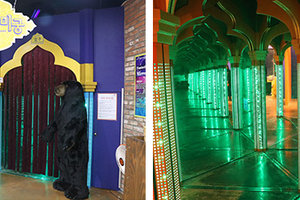印度王后阶梯井The Queen’s Stepwell
2024-11-09 12:43 游四海旅游网 1408条点评
印度王后阶梯井(The Queen’s Stepwell),也称印度巴坦王后阶梯井。位于印度帕坦县,是一座带有台阶的人可以自由上下的井,由一位印度王后建于公元11世纪。这种井是印度古吉拉特邦巴坦地区的特色。
这座遗址反应了印度十一世纪在历史、建筑、雕塑以及科学技术和宗教艺术方面的成就。它包括了印度教万神殿里几乎所有主要的神袛,以及各色各样的天女形象,还有许许多多雕刻在廊柱里的举世闻名的印度古老神话和寓言故事。
除了艺术价值外,印度王后阶梯井同样在当时具有十分重要的实用价值。建筑分两大部分:一端是一口圆筒形的井,另一端是一个与之相连接的长方形“水池”。井壁靠“水池”的一端留下了一个缺口,使井水能自动地流向“水池”。这口井直径10米深度达30米,井壁内布满了层层雕塑。井的东面是长方形的“水池”,长达69米,宽22米,有台阶层层向下。虽然印度王后阶梯井受到了一定程度的损坏,但至今仍具有极高的历史意义。于2014年被列入联合国世界文化遗产。
-
地址:
Mohan Nagar Socity Samalpati, Gujarat 384265, India
-
开放时间:
每天8:00-18:00
小贴士
参观印度王后阶梯井的最好季节是10月至次年的3月。
印度王后阶梯井The Queen’s Stepwell问答










印度王后阶梯井The Queen’s Stepwell旅游评价886条
0/140
wyj2011751734843959
amathlgs1734843967
wyj2011751734848191
Rani-ki-Vav, on the banks of the Saraswati River, was initially built as a memorial to a king in the 11th century AD. Stepwells are a distinctive form of subterranean water resource and storage systems on the Indian subcontinent, and have been constructed since the 3rd millennium BC. They evolved over time from what was basically a pit in sandy soil towards elaborate multi-storey works of art and architecture. Rani-ki-Vav was built at the height of craftsmens’ ability in stepwell construction and the Maru-Gurjara architectural style, reflecting mastery of this complex technique and great beauty of detail and proportions. Designed as an inverted temple highlighting the sanctity of water, it is divided into seven levels of stairs with sculptural panels of high artistic quality; more than 500 principle sculptures and over a thousand minor ones combine religious, mythological and secular imagery, often referencing literary works. The fourth level is the deepest and leads into a rectangular tank 9.5 m by 9.4 m, at a depth of 23 m. The well is located at the westernmost end of the property and consists of a shaft 10 m in diameter and 30 m deep.
wyj2011751734848200
wyj2011751734848209
wyj2011751734848217